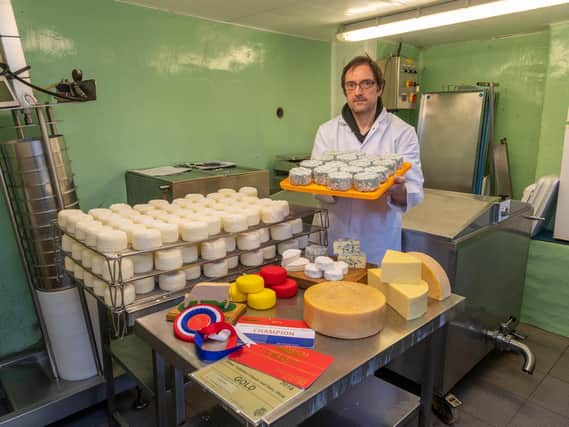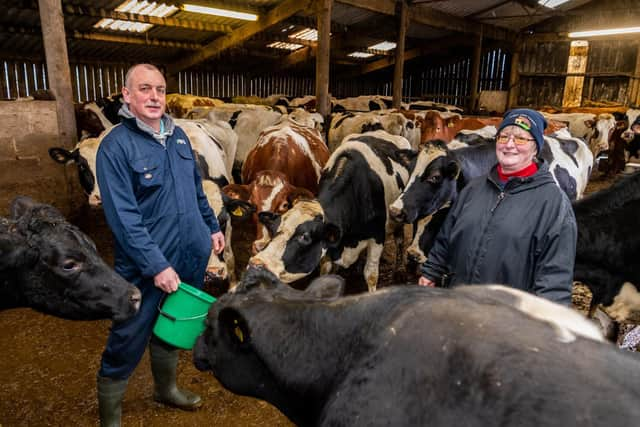Farm of the Week: A career change from IT to cheesemaking pays off at one of the Upper Calder Valley's last dairy farms


Brother and sister Alan Sutcliffe and Sandra Evans are partners in Pextenement Farm, one of two remaining dairy farms between Todmorden and Hebden Bridge in the Upper Calder Valley.
“Going organic is a way of sustaining our small dairy farm up here on the hills above Todmorden,” Alan said.
Advertisement
Hide AdAdvertisement
Hide Ad“If we hadn’t done it 20 years ago we wouldn’t be in dairy farming today.


“Our dad, Ronald, was always leaning towards organic farming using very little pesticide and fertiliser, but being nearly organic brings no premium, which is what Sandra and I are always looking to achieve for our milk.”
The pair started the two-year conversion from conventional dairying to organic, but said initially they didn’t see the uplift they had been anticipating.
“The change was easy as we didn’t need to find another buyer, at that time we were selling to Dairy Farmers of Britain and they wanted an organic milk pool.
Advertisement
Hide AdAdvertisement
Hide Ad“But everyone seemed to go that way at the same time and with a surplus the premium we’d anticipated almost disappeared. It took time to get the supply and demand back into balance.
“Our land is all classed as seriously disadvantaged and down to permanent grass.
“Dad always used to say it was best to ‘keep it greenside up’ and we went on to a grass-based system because of the cost of organic feed in producing organic milk,” said Sandra.
“We are currently very lucky to have found a good local supply of certified organic spent brewers grains from Wim van der Spek’s Little Valley Brewery in Cragg Vale, which means we don’t have to rely as much on buying concentrate.”
Advertisement
Hide AdAdvertisement
Hide AdChanging the dairy herd of 60 milking cows from largely Freisian to predominantly the MRI (Meuse Rhine Issel) breed has been a major influence in their dairy farm today.
But Alan said the difference really hit home when Sandra’s partner, Carl, swapped a career in IT for cheese making. He and Sandra now run Pextenement Cheese Co which is based on the farm.
“The MRI is generally a lower yielding cow and ours produce an average of around 5,000 litres a year, but with a really high protein count that is ideal for cheese,” said Alan.
“I had become disillusioned with the British Friesian breed as it had moved away from what was right for us at between 600-950ft. We looked around at other breeds to get the kind of cow we wanted and bought an MRI bull from a farmer in Pilling near Preston 15 years ago. We are now on our fourth MRI bull.”
Advertisement
Hide AdAdvertisement
Hide AdCrossbreeding their Friesians and Ayrshires with the MRIs has led to the herd now inching closer to full MRI status, said Sandra.
“It is really strange that the breed works so well here. It comes from one of the flattest, lowest lying areas of the world, the confluence of the three rivers in the breed’s name, but it seems to like our hills and the breed also has a reputation for hardiness and thriving on rough pasture.”
Alan said organic milk and cheese has taken an upturn during the pandemic and he has confidence in their liquid milk buyers OMSCO (Organic Milk Suppliers Cooperative).
“I’ve always felt since joining OMSCO that they have a positive outlook which helps with all the doom and gloom,” he said.
Advertisement
Hide AdAdvertisement
Hide AdGarnet Sutcliffe, Alan and Sandra’s grandfather, became tenant of Pextenemet Farm in 1924, with their father Ronald and uncle Norman taking over as N&R Sutcliffe.
“Pextenement is where we grow the young stock and keep the dry cows. It was bought in the late 1950s and Higher East Lee Farm where we milk the cows was added in the 1960s,” said Alan.
“We joined dad and uncle Norman as partners after having initially taken on ‘proper’ jobs as our mum Christine and dad encouraged us. I’d apprenticed and become a self-employed electrician but always continued milking alongside my dad and Sandra worked for the Halifax Building Society.”
Pigs and poultry once played their part at Pextenement but today’s additional incomes are generated from calf sales and cheese. Sandra said the idea to start making cheese came about after a holiday in Devon.
Advertisement
Hide AdAdvertisement
Hide Ad“Carl and I visited Buckfast Abbey where he bought a book about cheesemaking.”
Interested in finding out more Carl went on a course hosted by the book’s author at Reaseheath College in Cheshire.
Their own cheesemaking business was launched in 2008 and Sandra said it has also grown organically.
Pextenement’s first organic cheese was a family recipe which was found while they were cleaning out what had been the old dairy in preparation for cheese making.
Advertisement
Hide AdAdvertisement
Hide AdEast Lee was made from the recipe written out by Alan and Sandra’s grandmother’s sister, Annie Williamson.
“It was a real find,” said Sandra.
“Carl had pretty much made the same cheese as Annie who had emigrated to Canada over 60 years ago. It’s a soft cheese, like a Brie.”
The farm’s land runs to around 200 acres that is either owned or tenanted and is all small fields and steep hills.
“We have a Blonde d’Aquitaine bull for beef cattle. Heifer calves produced are sold to suckler farms,” said Alan.
Advertisement
Hide AdAdvertisement
Hide Ad“We sell the bull calves produced by either the Blonde or the MRI at Skipton livestock market.”
The origins of the farm name have been a source of much conjecture. “Pex was used a lot in names around Todmorden many years ago,” said Justine.
“Pextenement is now the only one left. Pex is said to have come from the word pecks which was a derivation of pigs. Tenement comes from what was regarded as a settlement of ten families.”
Comment Guidelines
National World encourages reader discussion on our stories. User feedback, insights and back-and-forth exchanges add a rich layer of context to reporting. Please review our Community Guidelines before commenting.